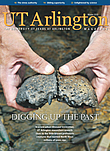Soldiering on
Enhanced University programs and new GI Bill draw veterans to campus
 Former Marine Corps member Joel Chaverri attends his graduate social work classes with 13 other Marines. The silver bracelet on his right arm carries the names of troops he served with and who died in Fallujah, Iraq.
Former Marine Corps member Joel Chaverri attends his graduate social work classes with 13 other Marines. The silver bracelet on his right arm carries the names of troops he served with and who died in Fallujah, Iraq.
“It’s a memorial to them and their sacrifice,” the 27-year-old veteran says. “It keeps me motivated.”
Not every student veteran displays his battlefield experience so obviously or discusses it so openly.
“When you first get back, it feels like no one understands you,” Chaverri says. “But there are thousands who do. It’s just connecting.”
Chaverri is one of the nearly 1,000 student veterans attending classes at UT Arlington thanks to the new GI Bill and the University’s veteran-friendly programs. The Post 9-11 GI Bill provides tuition, fees and living expenses for veterans with active military duty since Sept. 11, 2001. Add the Yellow Ribbon GI Education Enhancement Program and Texas’ Hazlewood Act benefits, and it’s understandable why the University’s veteran population jumped by 250 last fall.

Graduate student Joel Chaverri wears a bracelet with the names of fallen soldiers he served with in Iraq.
Connecting student veterans with the best benefits is just one of the services UT Arlington offers. The Veterans Alliance of UT Arlington is a social and support network, while the Student Veterans Project in the School of Social Work finds help for veterans, whether for benefits or counseling for post-traumatic stress syndrome.
A new mentoring program matches former military students with corporate and higher education volunteers. The University’s Student Veteran Advisory Council, composed of faculty and staff, delivers more ays to assist student veterans in transitioning from battlefield to classroom.
Chaverri, who earned a bachelor’s degree in social work at UT Arlington, found that conversion frustrating. “You get used to a certain reaction from your peers and leaders. You tell someone to do something, and he does it. Suddenly, all people—peers, leaders, authority—react differently. You’re lost.”
Anita Perez, coordinator of the Veterans Affairs Office, says veterans speak the same language: military. Her all-veteran staff can relate to students’ questions and confusion about the numerous assistance programs.
“You know when you walk in that office that we are going to understand,” Chaverri says. “Everyone is on your level.”
The staff also relate to the transition. Perez, a UT Arlington graduate, served in Iraq as an Army postal clerk in 2004-05.
“Mine was not a horrible deployment. But even with the best of deployments, it’s hard to come back here,” the former reservist says. “In the military you know you’ll get fed. I had to build up my self-reliance.”
Reservists are concerned that they will be deployed again before graduating, Perez adds. That’s what happened to nursing student Rhyan Fernie, who worked in the Veterans Affairs Office. He had to withdraw from classes when he was called up for a sixth tour of duty, this time to Afghanistan.
“When he gets back, we’ll be there for him,” Perez says.
“We” meaning the UT Arlington community.














